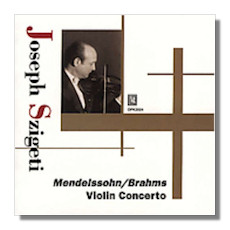
The Internet's Premier Classical Music Source
Related Links
-
Brahms Reviews
Mendelssohn Reviews - Latest Reviews
- More Reviews
-
By Composer
-
Collections
DVD & Blu-ray
Books
Concert Reviews
Articles/Interviews
Software
Audio
Search Amazon
Recommended Links
Site News
 CD Review
CD Review
Joseph Szigeti Plays

- Felix Mendelssohn: Violin Concerto in E minor, Op. 64
- Johannes Brahms: Violin Concerto in D Major, Op. 77*
Joseph Szigeti, violin
London Philharmonic Orchestra/Thomas Beecham
* Hallé Orchestra/Hamilton Harty
Opus Kura OPK2024
These performances have been released on seemingly every label devoted to historical programs. That's because they are truly historic, two of Szigeti's finest recorded efforts with orchestra. Opus Kura may not work with the very best pressings available, or at least that's what the poorly translated notes appear to imply. However, they are surely good enough to tell us what's going on, and the 1928 Brahms is especially good for the time period.
Of the two concertos, the Brahms is the more significant. I like Szigeti's extroverted and muscular take on the Mendelssohn, a concerto that many just play as pretty noise. Still, he's not Heifetz, and Thomas Beecham isn't what he would later be for Heifetz, either. The London Philharmonic, which would later be a selling point for the Beethoven and Brahms concertos with Kreisler, is just sort of phoning it in here. And Beecham himself proves a more involved partner in the same work 17 years later. Still, let's not kid ourselves, Szigeti is still in excellent form here, and the partnership between conductor and soloist is still a warm one.
Yet the 1928 Brahms is the real reason to buy this disc (or, if you're in the U.K, the same coupling on Naxos Historical 8.110948). The Hallé Orchestra under Hamilton Harty proves a good orchestra, arguably the best in Brittan at the time. But nobody listens to 1920's concerto collaborations for the orchestra (a good thing, too!) No, we listen for Szigeti's golden tone, so different from Kreisler, but equally valid. If anything, I prefer Szigeti in this work, he gets better orchestral support and is more direct a player. He certainly doesn't have Kreisler's purity of sound or photogenic powers (he's rougher overall) but he does present perhaps the greatest recording of this work to this point. In the Finale, he surpasses both of Kreisler's efforts; the lumpy, indifferent one from 1927, and the better, less technically robust one from 1936. Szigeti blazes and even the limited sonic quality cannot mask that this is a great performance. Fans of vintage violin playing would do well not to forget this great, and these are exceptional reminders of his art.
Copyright © 2014, Brian Wigman



















